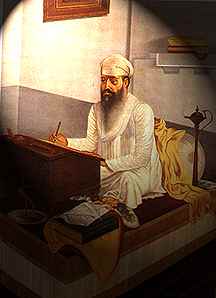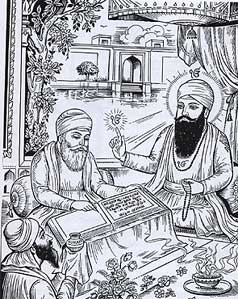

GURDAS,
the amanuensis who wrote the Adi Granth at the dictation of Guru Arjun, was also
the author of 39 vars (ballads in the heroic metre) in Punjabi and 556 kabits
(couplets) in Braj, of which the former are of some historical and theological
importance. They are the only really authentic references to the period of the
3rd, 4th, 5th, and 6th gurus by a Sikh. His commentary on Sikh practices are valuable
indications of the state of things at the time and are therefore regarded as the
"key" to an understanding of the Sikh scriptures.
There is some uncertainty
about the year of Gurdas' birth. Most historians have placed it in the time of
the second guru, Angad. Others believe that he was born after Amar Das' succession
as the third guru. They contend that the name Gurdas was given by the third guru
and, since the naming ceremony is performed soon after birth, the event could
not have taken place very much earlier. He was therefore born sometime between
1540 and 1560.
Gurdas was the son of Datar Chand, the younger brother of the
third guru, who took the child's education into his own hands. He was quick to
learn and soon became one of the chief exponents of the teachings of the gurus.
On the death of Amar Das, the fourth guru, Ram Das, formally initiated Gurdas
into the faith and sent him to Agra as a missionary. On the death of Ram Das,
Gurdas returned to Amritsar and presented himself before Ram Das' successor, Guru
Arjun. He was first engaged in trying to appease Prithi Chand, the Guru's elder
brother, who had set himself up as a rival guru and had launched a campaign of
vilification against Arjun. Gurdas failed in his mission. His var (36) on Prithi
Chand's attitude is full of vituperation. He came back to his master and turned
his attention to purely academic pursuits. In 1603, when the Guru started
the great task of compiling the Adi Granth, he chose Gurdas as the scribe (below).
The volume was completed in the summer of 1604 and installed in the Hari-mandir.

Emperor
Akbar, while passing through the Punjab, desired to scrutinise the sacred volume
and see for himself whether there was any truth in the allegation that it contained
references derogatory to Islam and the Prophet. Gurdas was entrusted with the
mission of taking the Granth to the Emperor. The volume was opened at random three
times, but none of the passages had anything offensive to Muslim susceptibilities;
on the contrary, at least two echoed sentiments complimentary to the Islamic faith.
Akbar made an offering of 51 gold mohurs to the holy book and presented a pair
of expensive Kashmere shawls to Gurdas.
After the execution of the fifth guru
and during the years when Guru Hargobind was in prison in Gwalior, the affairs
ot the Sikh community were left in the hands of trusted followers, among whom
were Baba Buddha and Bhai Gurdas.
On the Guru's release, Gurdas was sent on
a mission to purchase horses from Kabul (the Guru having decided to arm his followers
and train them as soldiers). Before he could complete the deal, the money was
stolen from him and the crestfallen Gurdas, being unable to face his master, fled
to Benares. He was apprehended and brought to Amritsar. The Guru forgave him,
and he again resumed his duties as the chief organiser of the scattered community.
At this time, the Guru's militant ways and his close association with Muslims
who had tormented his father caused a certain amount of unrest in the Sikh community.
Gurdas rose to his master's defence. To him the Guru was "the destroyer of
enemy hordes, the hero of battles, the great Warrior" as well as the "great
benefactor."
Gurdas remained celibate and died at Goindwal in 1629. His
funeral rites were performed by Guru Hargobind himself.
Historical Importance
of Gurdas' Work
Bhai Gurdas did not, set out to write a work of history,
but there are several references (mostly in var 11) to persons and events which
are of some importance to the historian of today. There are 85 passages scattered
in the 39 vars which deserve attention, viz. var i pauil 17-48, var 11, var 21
pauri 13-31, var 24 pauri 1-25, var 26 pauri 31 and 34, var 39 pauri 2 and 3,
var 3 pauri 12, var so pauri1 and var 38 pauri 20.
There are several very notable
and inexplicable omissions in Gurdas' writings. He has, for instance, produced
a list of the important disciples of the earlier gurus. In the list of adherents
of Guru Nanak the name of Rai Bular, the landlord of Talwandi, who was among Guru
Nanak's earliest and most important disciples, is missing. (And for a better reason,
that of Bala Sandhu.) Gurdas has also nothing to say about the compilation of
the Adi Granth and its scrutiny by Emperor Akbar. The reference to the execution
of the fifth guru is in the vaguest terms:
The Guru hath taken his abode
in the river
among the fish, As moths that see the flame fall upon it and
merge
their light with His light, As deer hear the sound of a distant drum .and
run
to it without a care of doom, As butterflies settle on the lotus and die
on
it during the night. The Guru's teachings we forget not, . and like the monsoon
birds are ever calling. The good have peace, the nectar of love,and the company
of the gentle. Thus is my life a sacrifice to Guru Arjun.
The only possible
explanation of these oversights is that Gurdas' primary object was to expound
certain points from the Scriptures and to propagate the ideals of the Sikh way
of life, not to write a book of history.

Guru Arjan dictating Gurbani to Bhai Gurdas
In the copies of Gurdas' vars which are current today, there is a 40th var written by a Sindhi poet of Shikarpur of the same name. The Sindhi Gurdas lived in the time of Banda (1670-1716). His composition, though in the same metre as that used by the elder Gurdas, is of higher poetic quality and is frequently quoted in describing the mission of Guru Gobind Singh.
Article taken with thanks from 'A History
of Sikhs' by Khushwant Singh.